- Home
- J. D. Robb
The In Death Collection, Books 30-32 Page 10
The In Death Collection, Books 30-32 Read online
Page 10
“Exactly,” she agreed. “Which goes right back to someone from U-Play. All it takes is one tag. He’s on his way. Get in, arrange to run into him—knock on the door a couple minutes after he’s inside. Time to have him shut down the droid so he’s got everything set for game time. ‘Hey, how’s it going—I was just in the neighborhood, thought I saw you come in.’ Bart’s all whistling-a-tune happy, excited. He’s nearly ready to launch his baby, just wants to play with it first, fine-tune. Here’s someone he knows. Another game player. It virtually has to be or why bring them in?”
She paced the room, stopped, put her hands on her hips. “I don’t like it. Too loose, too many variables.” She closed her eyes a moment, tried to see another angle. “He takes the game disc, but doesn’t log it. Or he did and someone doctored the log. Either way, it’s a work thing. Someone from work, someone involved in the project, maybe someone he wants along to help with specifics. But on the down-low. They don’t come in together, so maybe the killer arranges to meet him. ‘I’ll be right behind you’ sort of thing. Gives him a chance to get in another way, before or after Bart leaves. Before’s better. Got a couple things to do first, so I’ll meet you. Access on the sly so nobody knows you’re there. Disc’s not logged out, and Bart’s place is a short walking distance from the warehouse. Busy place. Is anyone really going to notice if someone’s gone for an hour?
“It could work.” Complicated, she thought again, but doable. And didn’t gamers prefer the complex? “You’re in, and the only person who knows you’re in is going to be dead.”
“And the weapon?” Roarke asked.
“Big shiny toy. Look what I’ve got. Just had to show you. Game’s in, and they play because that’s got to be part of it. The competition, the game. It wasn’t a goddamn accident. It was premeditated. Otherwise there’s no need to avoid coming in through security. No need to time it just so. Some sort of war fantasy, fight, sports—something to explain the minor bruising. Fight. Sword fight? Knights in shining freaking armor or warlords or whatever the fucking hell boys play.”
She circled the room trying to see it, to get some sort of picture in her head. “Maybe Bart’s getting the upper hand, racking up points. That just pisses you off, helps wind you up for the kill. Give him a taste first or maybe you just missed. First blood with that arm wound. See the shock on his face, smell the blood—it’s like copper on the back of the throat. Then one vicious swing, and it’s done. End of game. The blood’s real though, so much of it now that copper taste is too strong. Clean up, change clothes, stuff the bloody ones in a bag. Get out the same way you got in.”
“And leave the game disc behind?”
“If he knew Bart well enough to get in, he knew him well enough to know the security. Anybody tries to eject without all the codes, it self-destructs. It’s just a copy. It’s not about the disc, it’s about the whole—the game, the company, the man, everything. Because to do what was done here, you were very, very pissed off. Passion,” she murmured. “Passion and ego more than money, I think. Money’ll play a part. It nearly always does, but it’s not leading this charge.”
She held up a hand as a new thought emerged. “He brought the disc home. Five-minute walk. I bet it’s not the first time. Did EDD download the full log?”
“It goes back to the beginning of the year. It’s archived prior. I only glanced at it as we’re working on getting into his comps and trying to piece together what we can from the disc. And don’t hope for much there. It’s hardly more than ashes.”
“But the log may give us a pattern. That, the building’s security discs, and the security discs and logs from U-Play.”
“It’s going to be a long night,” Roarke predicted.
7
ON THE WAY HOME SHE CHECKED IN WITH members of the team, logged the updates. She sent copies of all reports to her commander, then requested a consult with Mira for the next day.
“Two arrests today,” she said, thinking of DuVaugne and Dubrosky. “Both deserve the cage time, but neither of them killed my vic. Someone closer than that. Someone more fun.”
She remembered Peabody’s angle. “These conventions—cons—where people get all dressed up in weird outfits, play games, have contests, take seminars. I bet you’d meet a lot of fun people at those, if that’s what you’re into.”
“Shared interests, like minds. That’s what you’re after.”
“And the weapons. Fancy magic sword. Maybe it was a bribe, or some sort of payment. Let me play the game, let me be—what did Bart call it with the Sing kids—your test study—and you can have the sword.”
“Most auctions and shops have records of that sort of sale. I can try to find it.” Roarke maneuvered around a maxibus, threaded the needle between a couple of Rapid Cabs while evening traffic spurted, snarled, or stalled. “But it’s just as likely it was private, and no record exists.”
“Worth a shot. Tie the sale to someone at U-Play. Someone he met at a con, and maybe hired. For the warehouse spot, for consulting. Someone he used before in test studies.” She stared out the window where the warmth had tourists flooding the sidewalks, but she saw a secured holo-room where her victim died in shoes wet from a whistling walk in the rain.
“He knew his killer,” she stated, “or whoever set him up for the kill.”
She thought of DuVaugne again as they drove through the gates of home. Not in the killing sense, but in taste, in scope. The steel and glass box, she thought, so cold, so hard, so desperately trendy. And here was Roarke’s taste and scope in the strong and graceful lines of home, the towers and turrets adding a little fancy, the streams and rivers of flowers, the warmth and color.
Yet the man who’d built it had lived in the cold and the hard for so long, as she had. When given the choice, he’d taken the strong and the warm.
And, in turn, had given them to her.
“We should eat.”
He turned to look at her as he stopped the car. “Now you’re stepping on my lines.”
“You could start the search for the weapon, and I’ll put something together.”
“Will you now?”
She couldn’t really fault his skepticism. “I won’t program pizza.”
He got out of the car, waited for her, took her hand. “What’s the occasion?”
“You have good taste in houses.”
“I have good taste in all manner of things. Especially wives.” He lifted her hand to his lips as they walked up the steps and into the house.
She gave Summerset a good, long study as he stood exactly where she’d expected, like a harbinger of doom in the foyer with the chub of cat at his feet.
“I saw your evil twin today,” she told him. “Wait, you’re the evil twin. I think he has the same tailor, too. I. M. Funereal.”
“Well, that was clever,” Roarke said and pinched the hand he’d just kissed. “We’ll be eating upstairs tonight,” he told Summerset.
“Hardly breaking news. There’s some very nice grilled swordfish, if the pair of you choose to eat like adults.”
“Swordfish,” Eve considered. “Might be lucky, considering. You didn’t have to pinch me,” she added as they continued up and the cat, his mind very likely on food, raced ahead of them. “I really did see his evil twin today. You can ask Peabody. Of the droid variety, and it had one of those fake-sounding upper-class Brit accents, but it was a ringer. I bet you could buy it cheap if you ever want to replace dour with droid.”
“You’re asking for another pinch.”
“Probably a bad idea, about the switch. As much as I hate to say it, I think the droid’s worse. Did Summerset ever tell you not to drink too many fizzies because they’re not really good for you?”
“Possibly. Probably,” Roarke said as they turned into the bedroom. “I want to change out of this suit.”
“And while he was doing that, he taught you how to steal.”
“I already knew how to steal. He taught me how to steal with a bit more finesse. Dinner,”
he said as she shed her own jacket. “And if it’s the swordfish, open a ’fifty-seven Lautrec. It should be a nice complement.”
“No pointers,” she told him and changed her boots for skids. “Otherwise it doesn’t count in my column.”
She strolled out, still wearing her weapon harness, which he assumed she’d forgotten she had on as it was as much a part of her as the shallow dent in her chin.
Wanting the ease and comfort, he changed into jeans and a T-shirt before making the ‘link calls he preferred to address in private. There had been too many eyes and ears on him throughout the day, he thought now. Cops’ eyes, cops’ ears. They might have been his wife’s, his friends’, but there were some matters easier done without the weight of the law on his shoulders.
Eve’s law, he thought, could be particularly heavy at times, so he programmed a series of runs, scans, and searches by remote before continuing on to his office, which intersected with hers.
He could hear her talking to the cat, ordering her computer to run a variety of probabilities, then her movements around the room.
Setting up her murder board, he concluded while he programmed searches from different angles and apexes for a sword that may or may not exist.
A fairly typical evening for them, Roarke supposed, and he had no complaints. He would have to devote several hours of what might have been free time to his own business due to the interruption of the day—and likely days more. But he liked his work, so that wasn’t a true sacrifice.
In any case, the interruption had been his call, his choice.
The boy had sparked something in him in life—all that enthusiasm and discovery. And the boy had touched something in him in death—the waste, the cruelty of the waste.
It had touched deep because Bart had trusted him—a competitor—and one with the means and experience to betray that trust and crush a young company like a hatching egg under a boot.
Perhaps that explained why he felt obligated to help find out who’d do so. Not to the company, but to the boy himself.
Eve had called Bart simple, Roarke recalled. He wasn’t sure he agreed entirely, but certainly Bart had been uncomplicated. Open, eager, honest, brilliant, and making a mark doing what he loved with people he loved.
Life should be so uncomplicated for everyone, Roarke thought.
Maybe, at the base of it, Bart had sparked something in him due to their differences rather than their similarities. No one, Roarke admitted, would ever consider him open or honest. And he’d never, even as a boy, held that fresh eagerness or casual brilliance.
Still, he’d made his mark while Bart had only begun to scratch the surface of his own potential.
He left the search on auto and walked through the shared doorway to see Eve finishing her murder board. As they often did, he thought, they’d have the dead as company for dinner.
The cat watched her, sprawled over the back of her sleep chair like a fat, furry blanket. Galahad switched his tail as a casual wave of greeting as Roarke crossed over. He ran a hand over the cat, head to switching tail, and got a low, murmuring purr in response.
“You took a while, so I figured I’d set up. I already fed the cat,” she added. “Don’t let him tell you different.”
Roarke picked up the wine she’d set on the table by the window—she’d taken his advice there—and poured two glasses. “The searches are running.” He lifted one of the hot lids and noted she’d chosen the swordfish, married it with asparagus, and fries.
“The fries are a compromise since I’m eating fish.” She turned from the completed board to take the wine he offered. “I thought about making yours with one of the rice deals you seem to like for no good reason I can think of. But then it’s more like going out to a restaurant than fixing a meal at home. So you get what I get.”
“You have the oddest thought patterns at times.” Because what she’d done, how and why she’d done it, chased off some of the shadows, he touched his glass to hers. “It looks good.”
“It ought to. I slaved over a cool AutoChef for a full five minutes.” She sat, smiled at him. “Why does a fish have a sword?”
“Is this a riddle?”
“No, it’s a question. Do they do the en guard, touché thing or just go around stabbing unarmed fish because they can?”
“Maybe they do battle with the hammerheads.”
“Sword’s got a longer reach than a hammer, but a hammer could break a sword. It might be interesting, but I think it’s stupid to bring a hammer to a swordfight, unless it’s all you’ve got.”
“Use whatever weapon comes to hand, and anything that comes to hand is a potential weapon.”
“Yeah. If Bart was gaming a swordfight, he wouldn’t have brought a hammer.”
Easier, Roarke realized, to consider the details of death than to sink into the philosophy of it. “Depending on the game, the level, the programming, he might have had to earn his weapons. They can also be lost or broken, jammed or simply run out of charge or ammunition, again depending.”
“Did you ever play with him?”
“A couple of times. We never did holo, as it generally takes more time, and the facilities. But we played some VR, and some straight comp. He was very good, quick reflexes, and though he tended to take unnecessary risks, he made up for that with enthusiasm. But for the most part we talked technology, the business, marketing. We only had contact a handful of times the past two or three years.”
“Did you ever have him over here?”
“No. I’m not as trusting, and there was never any reason or purpose to it. We didn’t actively socialize, or have anything in common really but a common interest. He was very young, on several levels, and as many in their twenties do, he considered someone in their thirties as another generation.”
“Jamie’s younger,” she pointed out, speaking of Feeney’s godson and another e-wiz. “He’s been around a lot. You’ve worked with him. So have I.”
“Bart was nothing like Jamie. He hadn’t that edge, the street savvy, and certainly not any aspirations to turn his considerable e-skills toward a career in EDD. Jamie’s the next thing to family.”
Roarke paused, sipped some wine. “And does this conversation help you justify bringing me, a competitor of your victim, into the investigation as a consultant?”
“I don’t have to justify your participation, but it doesn’t hurt given the business interests, and the fact you told me you have a similar project under development, to keep it all open.”
“It’s always pleasant not to be a suspect.” He watched irritation cross her face, and honestly couldn’t say why he’d pushed that particular button.
“Look, from a strictly objective view, you could have smashed U-Play before it ever got off the ground, and at any point since then. They don’t threaten you. Hell, you’ve got the hammer and the sword, plus a couple of blasters and a pocketful of boomers. If you want to take down a company, and effectively, its brain, you use money, strategy, and guile, not a magic sword.”
She stabbed a piece of fish. “You have another perspective on the victim—not a partner, not exactly a friend, not an enemy, and a competitor only in the most technical sense. So you add to my picture of him while laying out the basics and the extent of your association.”
“That’s a lot of explanation,” he said mildly.
“Maybe.”
“Then I suppose I should add my own, in the interest of full disclosure and openness. I’ve implemented level-three runs on any of my people involved in the development of the holo-game project, and those on the fringes of it. Their associations, financials, communications.”
“That’s not your job.”
“I disagree. They’re my people, and I will be bloody well sure no one in my employ is involved in this, on any level, in any way.”
“The Privacy Act—”
“Be damned.” And a hot thread of anger, he admitted, felt more comfortable than this inexplicable sorrow. “Anyone employed by me or seekin
g to be is routinely screened, and signs a waiver.”
“Not for a level three, not without cause. That’s cop or government level.”
“Murder would be cause on my gauge.” His tone was as crisp and chilly as the wine.
“It’s a gray area.”
“Your gray is broader and darker than mine. There are incentives attached to a project like this, bonuses that could be very lucrative.” He stopped again, angled his head. “Which you know very well already as you’ve done or are doing your own level three, on my people.”
“It’s my job.”
“You might have told me. You might have trusted me enough to get the information for you.”
“You might have told me,” she countered. “Trusted me enough to do my job. Dammit. I didn’t tell you because you had a personal attachment to the victim, and I didn’t see the point in adding to the upset by telling you or asking you to get the data. What’s your excuse?”
“I don’t need an excuse. They’re my people. But the fact is once I have the data, and—whatever the results—pass it to you, you’d be able to contract or expand your suspect list.”
“All you had to do was tell me.”
“And the reverse holds just as true, so there’s no point in you getting pissed off.”
“I’m not pissed off. I’m ... aggravated.”
“You’re aggravated? Consider, Eve, how aggravated I might be if it turns out that someone I trust, someone I pay had anything whatsoever to do with that.”
He gestured to the board.
“You can’t be or feel responsible for every person who pulls a check from Roarke Industries.” She threw up her hands. “It’s half the fucking world.”
More than one hot thread of anger wound through him now. “Oh yes, I bloody well can, and it’s nothing to do with numbers and everything to do with being in charge. You are and feel exactly the same about every cop in your division, in the whole shagging department come to that.”
She started to argue, then stopped because he was right about that much. “Any data from your run has to coincide with mine, and officially come from mine whether it clears your whole crew or somebody bobs to the surface.”

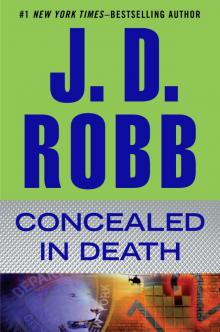 Concealed in Death
Concealed in Death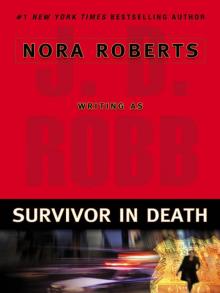 Survivor in Death
Survivor in Death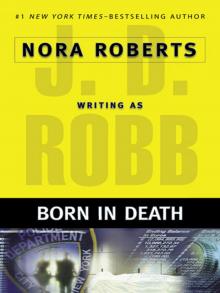 Born in Death
Born in Death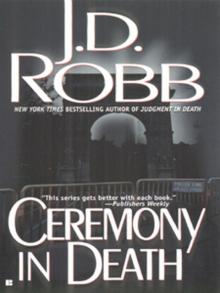 Ceremony in Death
Ceremony in Death Indulgence in Death
Indulgence in Death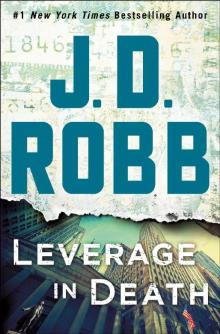 Leverage in Death
Leverage in Death Devoted in Death
Devoted in Death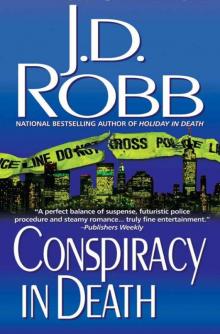 Conspiracy in Death
Conspiracy in Death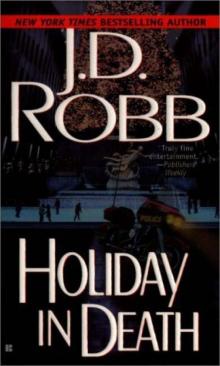 Holiday in Death
Holiday in Death The Unquiet
The Unquiet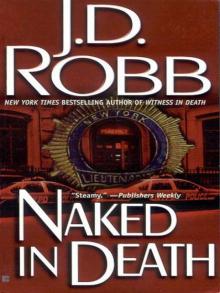 Naked in Death
Naked in Death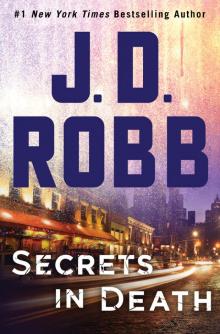 Secrets in Death
Secrets in Death Seduction in Death
Seduction in Death Strangers in Death
Strangers in Death Creation in Death
Creation in Death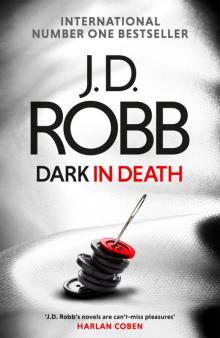 Dark in Death
Dark in Death Possession in Death
Possession in Death Visions in Death
Visions in Death Midnight in Death
Midnight in Death Innocent in Death
Innocent in Death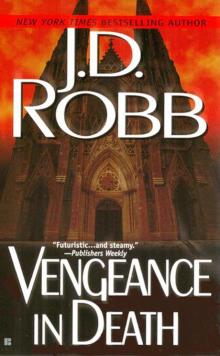 Vengeance in Death
Vengeance in Death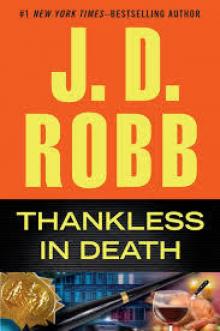 Thankless in Death
Thankless in Death Glory in Death
Glory in Death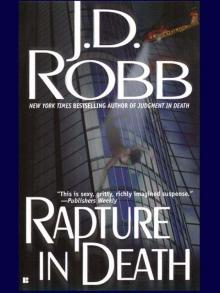 Rapture in Death
Rapture in Death Echoes in Death
Echoes in Death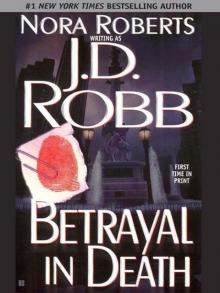 Betrayal in Death
Betrayal in Death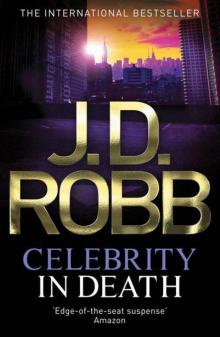 Celebrity in Death
Celebrity in Death Immortal in Death
Immortal in Death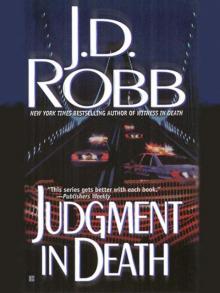 Judgment in Death
Judgment in Death Ritual in Death
Ritual in Death Portrait in Death
Portrait in Death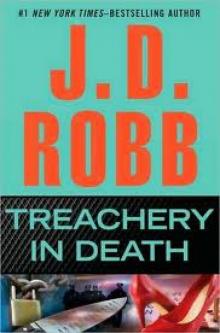 Treachery in Death
Treachery in Death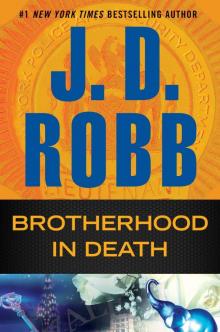 Brotherhood in Death
Brotherhood in Death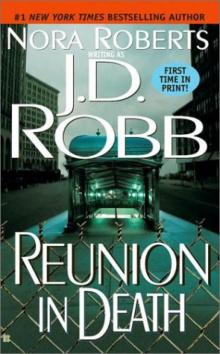 Reunion in Death
Reunion in Death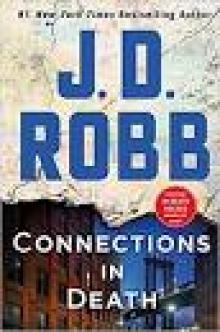 Connections in Death: An Eve Dallas Novel
Connections in Death: An Eve Dallas Novel Imitation in Death
Imitation in Death New York to Dallas
New York to Dallas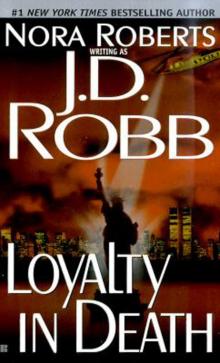 Loyalty in Death
Loyalty in Death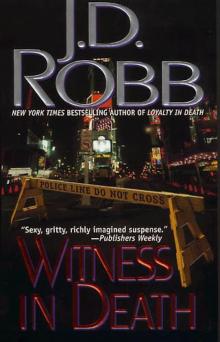 Witness in Death
Witness in Death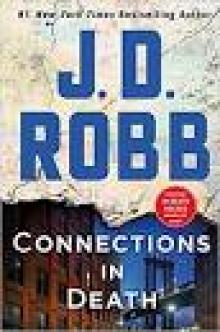 Connections in Death
Connections in Death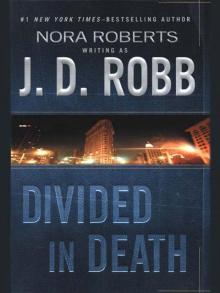 Divided in Death
Divided in Death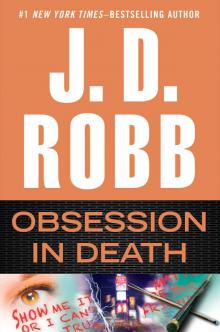 Obsession in Death
Obsession in Death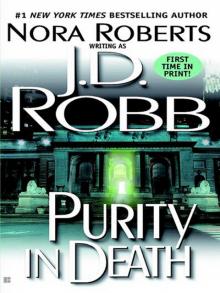 Purity in Death
Purity in Death Festive in Death
Festive in Death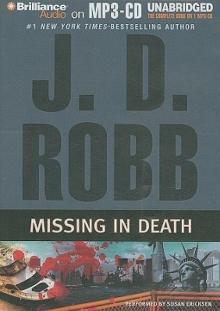 Missing in Death
Missing in Death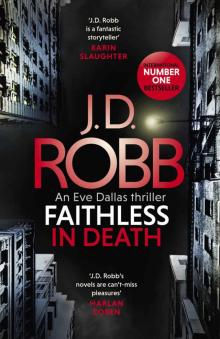 Faithless in Death: An Eve Dallas Thriller (Book 52)
Faithless in Death: An Eve Dallas Thriller (Book 52)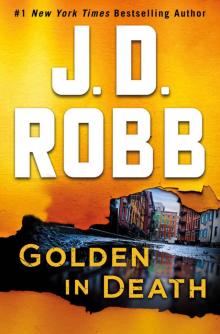 Golden in Death
Golden in Death The In Death Christmas Collection
The In Death Christmas Collection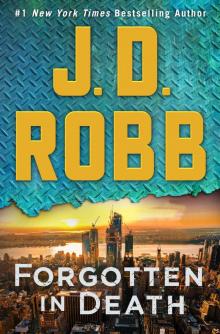 Forgotten in Death
Forgotten in Death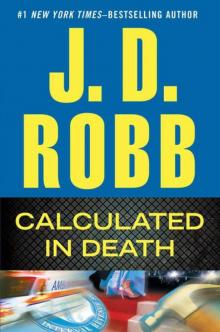 Calculated in Death
Calculated in Death Salvation in Death
Salvation in Death Interlude in Death
Interlude in Death Haunted in Death
Haunted in Death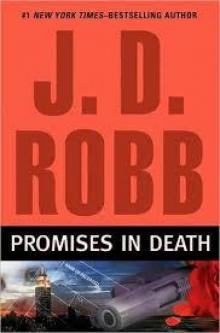 Promises in Death
Promises in Death In Death 07.5 - Midnight in Death
In Death 07.5 - Midnight in Death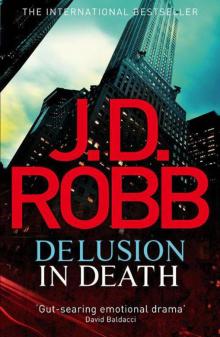 44 Delusion in Death
44 Delusion in Death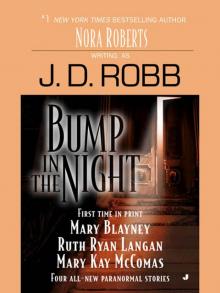 Bump in the Night
Bump in the Night The In Death Collection, Books 16-20
The In Death Collection, Books 16-20![[In Death 17] - Imitation in Death Read online](http://i1.bookreadfree.com/i/03/20/in_death_17_-_imitation_in_death_preview.jpg) [In Death 17] - Imitation in Death
[In Death 17] - Imitation in Death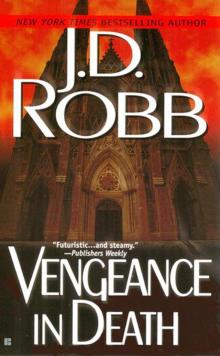 In Death 06 - Vengeance in Death
In Death 06 - Vengeance in Death Dead Of Night
Dead Of Night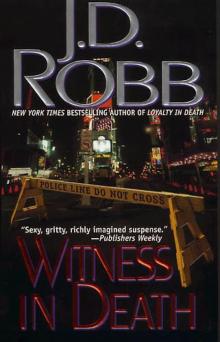 In Death 10 - Witness in Death
In Death 10 - Witness in Death![[In Death 16] - Portrait in Death Read online](http://i1.bookreadfree.com/i1/03/27/in_death_16_-_portrait_in_death_preview.jpg) [In Death 16] - Portrait in Death
[In Death 16] - Portrait in Death Possession in Death edahr-39
Possession in Death edahr-39 Remember When edahr-20
Remember When edahr-20 Big Jack
Big Jack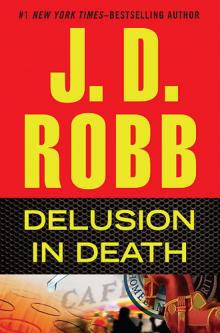 Delusion in Death edahr-44
Delusion in Death edahr-44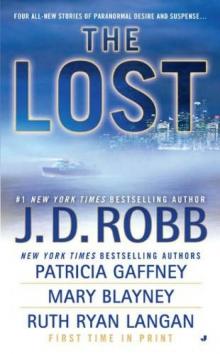 Missing in Death edahr-36
Missing in Death edahr-36 Origin in Death edahr-24
Origin in Death edahr-24![[In Death 18] - Divided in Death Read online](http://i1.bookreadfree.com/i1/04/03/in_death_18_-_divided_in_death_preview.jpg) [In Death 18] - Divided in Death
[In Death 18] - Divided in Death The Lost
The Lost![[In Death 05] - Ceremony in Death Read online](http://i1.bookreadfree.com/i1/04/01/in_death_05_-_ceremony_in_death_preview.jpg) [In Death 05] - Ceremony in Death
[In Death 05] - Ceremony in Death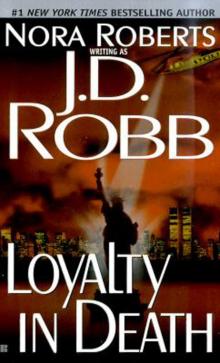 In Death 09 - Loyalty in Death
In Death 09 - Loyalty in Death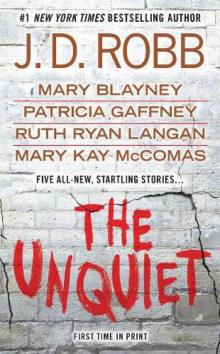 Chaos in Death edahr-42
Chaos in Death edahr-42 In Death 12.5 - Interlude in Death
In Death 12.5 - Interlude in Death![In Death [47] Leverage in Death Read online](http://i1.bookreadfree.com/i1/04/01/in_death_47_leverage_in_death_preview.jpg) In Death [47] Leverage in Death
In Death [47] Leverage in Death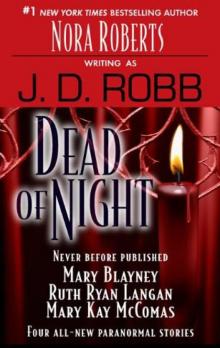 In Death - 24.50 - Dead of Night
In Death - 24.50 - Dead of Night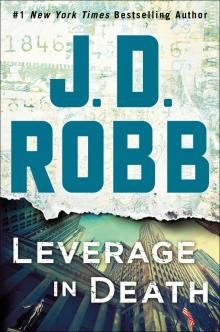 Leverage in Death--An Eve Dallas Novel
Leverage in Death--An Eve Dallas Novel![[In Death 24] - Innocent in Death Read online](http://i1.bookreadfree.com/i1/04/05/in_death_24_-_innocent_in_death_preview.jpg) [In Death 24] - Innocent in Death
[In Death 24] - Innocent in Death![[In Death 15] - Purity in Death Read online](http://i1.bookreadfree.com/i1/04/05/in_death_15_-_purity_in_death_preview.jpg) [In Death 15] - Purity in Death
[In Death 15] - Purity in Death The In Death Collection, Books 26-29
The In Death Collection, Books 26-29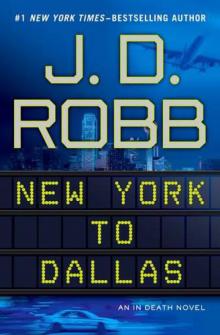 New York to Dallas edahr-41
New York to Dallas edahr-41 The Other Side
The Other Side The In Death Collection 06-10
The In Death Collection 06-10![[In Death 08] - Conspiracy in Death Read online](http://i1.bookreadfree.com/i2/04/05/in_death_08_-_conspiracy_in_death_preview.jpg) [In Death 08] - Conspiracy in Death
[In Death 08] - Conspiracy in Death The In Death Collection, Books 21-25
The In Death Collection, Books 21-25 Memory in Death edahr-25
Memory in Death edahr-25 The In Death Collection, Books 30-32
The In Death Collection, Books 30-32 Down the Rabbit Hole
Down the Rabbit Hole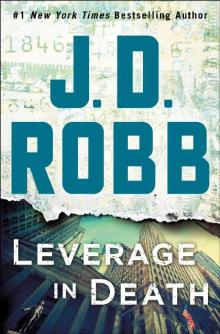 Leverage in Death: An Eve Dallas Novel (In Death, Book 47)
Leverage in Death: An Eve Dallas Novel (In Death, Book 47) The In Death Collection, Books 6-10
The In Death Collection, Books 6-10 The In Death Collection, Books 11-15
The In Death Collection, Books 11-15 Celebrity in Death edahr-43
Celebrity in Death edahr-43 Treachery in Death edahr-40
Treachery in Death edahr-40![[In Death 12] - Betrayal in Death Read online](http://i1.bookreadfree.com/i2/04/13/in_death_12_-_betrayal_in_death_preview.jpg) [In Death 12] - Betrayal in Death
[In Death 12] - Betrayal in Death The In Death Collection, Books 1-5
The In Death Collection, Books 1-5